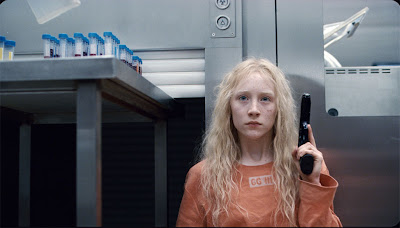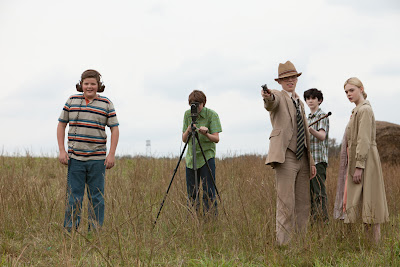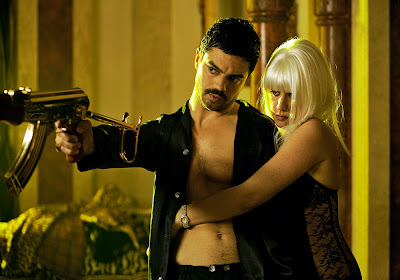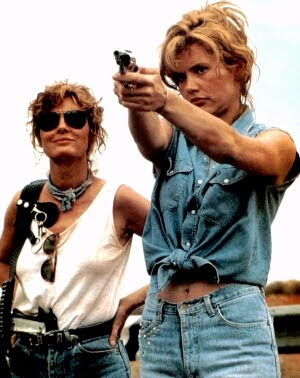
---beaten for
filming a policeman
---Scott and Dargis
consider recent violent women in cinema:
"Jean-Luc Godard posited that all he needed to make a movie was a girl and a gun. (Some of his later work makes me wish he had stuck to that formula.) To put the gun in the hands of the girl may be a way to cut out the middleman, as it were, and also, as you suggest, to maximize commercial potential by providing something for everyone. I think that calculation works best when the filmmakers show some interest in exploring the complex intertwinings of sex and violence, rather than simply mashing them up or using one as a substitute for the other. On the other hand, it’s sometimes just fun to watch
Saoirse Ronan or
Ellen Page — or all the other sisters of
Angelina Jolie, our era’s pioneering and still supreme female action star — beat up some deserving Badman."
---Richard Brody
remembers Chaplin's
The Great Dictator
---Kaid Benfield's "How History
Killed the Suburb":
"Beyond demographic shifts per se, Canadian urban observer Wendy Waters (
in her blog All About Cities) attributes the increase in demand for walkable places in part to changes in the larger economy and culture, including these:
- Maturation of the knowledge economy, reliant on the Internet, that has benefited from a very urban workforce constantly looking for inspiration;
- De-industrialization in many metro areas as manufacturing declined either outright or as a percentage of employment (while service and knowledge jobs grew);
- Generations X and Y started to make their ideas and culture felt in cities, as they embraced an experience economy over a consumer goods and large-home-and-car based one;
- Women's higher rate of degree attainment resulted in career women selecting short commutes and urban living (with the trade-offs) over suburban homes;
- The fertility rate edged up slightly, likely as younger Boomer and older Gen-X women who had postponed children had one or two children but didn't give up urban living or urban careers and wanted short commutes;
- Millennials defining freedom as their "first iPhone" rather than first car, and driving less;
- More recently in 2008 and now in 2011, high gas prices are encouraging more people to rethink automotive lifestyles."

---J. J. Abrams
shares the 7 films that helped shape
Super 8
---Pauline Kael's 1981
review of De Palma's
Blow Out:
"Blow Out is a variation on Antonioni’s
Blow-Up (1966), and the core idea probably comes from the compound joke in De Palma’s 1968 film
Greetings: A young man tries to show his girlfriend enlarged photographs that he claims reveal figures on the “grassy knoll,” and he announces, “This will break the Kennedy case wide open.” Bored, she says, “I saw
Blow-Up—I know how this comes out. It’s all blurry—you can’t tell a thing.” But there’s nothing blurry in this new film. It’s also a variation on Coppola’s
The Conversation (1974), and it connects almost subliminally with recent political events—with Chappaquiddick and with Nelson Rockefeller’s death. And as the film proceeds, and the murderous zealot Burke (John Lithgow) appears, it also ties in with the “clandestine operations” and “dirty tricks” of the Nixon years. It’s a Watergate movie, and on paper it might seem to be just a political melodrama, but it has an intensity that makes it unlike any other political film. If you’re in a vehicle that’s skidding into a snowbank or a guardrail, your senses are awakened, and in the second before you hit, you’re acutely, almost languorously aware of everything going on around you—it’s the trancelike effect sometimes achieved on the screen by slow motion. De Palma keeps our senses heightened that way all through
Blow Out; the entire movie has the rapt intensity that he got in the slow-motion sequences in
The Fury (1978). Only now, De Palma can do it at normal speed."
---
Businessweek time
lapse
---Natalia Cecire
notes the risks of academic blogging
---Bill Moyers
interviews David Simon of
The Wire:
Bill Moyers: I was struck by something that you said. You were wrestling with this one big existential question. You talked about drug addicts who would come out of detox and then try to steel-jaw themselves through their neighborhood. And then they’d come face-to-face with the question—which is…?
David Simon: “What am I doing here?” You know, a guy coming out of addiction at thirty, thirty-five, because it often takes to that age, he often got into addiction with a string of problems, some of which were interpersonal and personal, and some of which were systemic. These really are the excess people in America. Our economy doesn’t need them—we don’t need 10 or 15 percent of our population. And certainly the ones who are undereducated, who have been ill-served by the inner-city school system, who have been unprepared for the technocracy of the modern economy, we pretend to need them. We pretend to educate the kids. We pretend that we’re actually including them in the American ideal, but we’re not. And they’re not foolish. They get it. They understand that the only viable economic base in their neighborhoods is this multibillion-dollar drug trade.

---the first
films of Spielberg, Coppola, Scorsese, and Lucas
---a 1979
interview with Terrence Malick:
"It would be difficult for me to make a film about contemporary America today. We live in such dark times and we have gradually lost our open spaces. We always had hope, the illusion that there was a place where we could live, where one could emigrate and go even further. Wilderness, this is the place where everything seems possible, where solidarity exists - and justice - where the virtues are somehow linked to this justice. In the region where I grew up, everyone felt it in a very strong way. This sense of space disappearing, we nevertheless can find it in cinema, which will pass it on to us There is so much to do: it's as if we were on the Mississippi Territory, in the eighteenth century. For an hour, or for two days, or longer, these films can enable small changes of heart, changes that mean the same thing: to live better and to love more. And even an old movie in poor and beaten condition and can give us that. What else is there to ask for?"
---"the scribes
behind summer's biggest blockbusters"
---Kenneth Branagh and
Thor

---lastly, Carina Chocano's "Thelma, Louise, and All the Pretty
Women":
"I also found myself in a state of more or less constant shock at the way the experience of being me was mediated at every level — at work, with guys, at the movies — by an apparently universally accepted notion of what it meant to be a girl (a notion that neither I nor any of the girls I knew recognized as our own). This notion had been communicated and exploited, I felt, fairly comprehensively by “Pretty Woman.” From the first shot of
Julia Roberts (her backside, in lacy underwear, in bed) to the falling-in-love scene when she gets a credit card after coupling with
Richard Gere on the hotel’s grand piano to the scene in which she is taught that Champagne is not to be crudely chugged but swished delicately around a ripe strawberry (as
Dorothy Parker once remarked, you can lead a whore to culture, etc.), there was scarcely a moment in this great popular romance that didn’t strike me then as transactional, instructional or otherwise deeply condescending.
By contrast, what “Thelma and Louise” did was unexpected and thrilling. It took all those feelings of alienation and anger — which until that point had mostly found expression in things like “Take Back the Night” rallies — and turned them into something rebellious, transgressive, iconic, punk rock and mainstream. And it forced this feminine perspective onto the popular culture at gunpoint. (But in a charming way, just like
Brad Pitt’s character taught Thelma how to do.)"
 ---beaten for filming a policeman
---beaten for filming a policeman



Comments